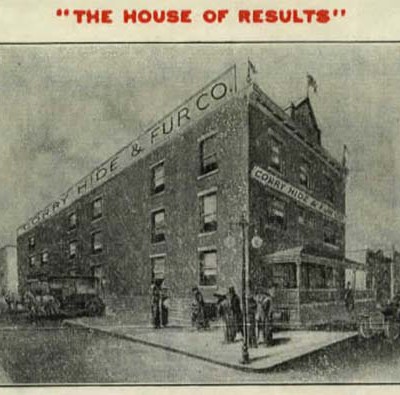
The Atlantic and Great Western Railroad built a ticket office at its intersection with the Sunbury and Erie Railroad, in northwestern Pennsylvania, in October 1861 and named the office Corry, after a landowner in the area. The area around the office grew with the development of the oil industry in Crawford and Venango counties. Corry, Pa. was incorporated as a borough in 1863 and a city in 1866.
A Jewish community emerged in Corry no later than 1873, which is the earliest date found in a Jewish cemetery a few miles north of the city. By 1880, the Jewish population was approximately 25, according to Statistics of the Jews of the United States, published by the Union of American Hebrew Congregations. The Jewish community organized Beth Israel Congregation around the same time, according to various county histories from the late 19th century. Beth Israel employed at least two rabbis in its early years—Rev. Galen and Rev. Bernstein—before hiring Rev. Solomon Fielchenfeld in about 1877. The community organized B’nai B’rith Ahavath Sholem Lodge No. 160 in 1870. The lodge merged with a lodge in Franklin, Pa., in about 1899 and closed in the years that followed. Beth Israel Congregation acquired a plot of land in November 1881, according to a Works Progress Administration Church Archives survey. A few years later, the congregation either traded or sold the land to the First Presbyterian Church and moved to an existing building on West Church Street. The congregation officially obtained a charter in 1883. Although incorporated as an Orthodox congregation, Beth Israel was among the first Jewish congregations in the region to allow mixed seating, a compromise between German and Polish factions among the membership, according to The Jewish Experience in Western Pennsylvania: A History, 1755-1945, by Jacob Feldman.
The Jewish community of Corry remained small throughout its existence. The American Jewish Yearbook listed a Jewish population of 50 in its 1907 edition, down to 34 in its 1918-1919 edition, up to 55 in its 1928-1929 edition and down again to 15 in its 1940-1941 edition. By the mid-1920s, Beth Israel Congregation could no longer support a full-time rabbi and only held services during the High Holidays, using the services of a rabbi from nearby Warren or Erie, according to the WPA survey. When the survey was conducted in 1939, the most recent burial date found in the Beth Israel cemetery was 1933. Many of the most recent interments found in the cemetery belong to the Berliner family, which ran a successful hide and fur business in the city from the 1880s to the 1940s.
Berliner Family Papers (MSS 297)